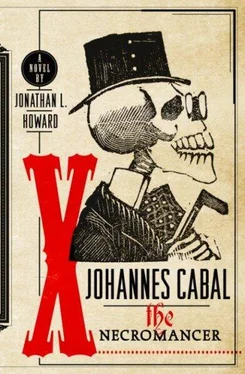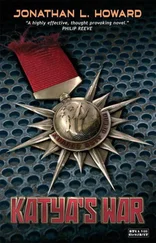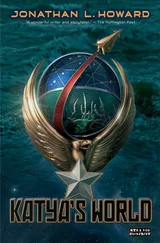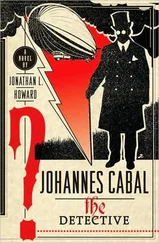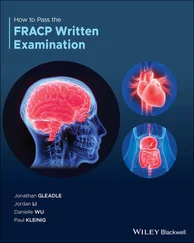“I should have left you face-down on the road, you blubbering fool. You were a waste of protein when you were alive, and now you’re dead you’re denying some tree sustenance.” He slapped the offending arm with the back of his hand and suddenly remembered he’d just that minute removed his rubber glove. He wiped the muck off on Denzil’s overalls. “This damage is irreparable. D’you understand that? There’s nothing I can do about it. It’s either going to have to come off or … or …” He considered carefully. “I can render it down, seal the stump, and attempt to animate the bones. Interesting problem. Report to my office at nine-thirty tomorrow. That’s all.” He noticed the riggers and recalled why he’d come over there in the first place. “And give the riggers every assistance in connecting the steam calliope with the engine’s boiler. Understand?”
A caw made Cabal look up. The crow had landed on the tallest organ pipe of the calliope and was looking down on him with an unwarranted air of superiority. “And you,” said Cabal, pointing at it. “If you do anything down one of those pipes, I will personally wring your neck. Understand?”
The crow moved its head in a very human “Oh, heck, you never let me have any fun” sort of way and flew down to settle on a tent peg.
Cabal had turned on his heel to walk away when he heard a sound that made him turn back. A bloodied tatterdemalion of a figure was leaning out of the train’s cab. With clumsy fingers it tried to get its scalp to stay in place, but this kept flopping forward like the brim of a particularly unappealing novelty hat. It looked at Cabal and held its hands out, dark with congealing blood. It groaned shudderingly. With the exception of Cabal, everybody took a step back.
“All right, that’s enough overacting,” snapped Cabal. “You turn up at ten.”
* * *
The music roll still needed installing. Cabal turned his logical eye upon the mechanism. Moving quickly, he reached in, pulled a lever back that brought a cross-arm with it, flipped up two side guards, took the music roll from one of the fascinated riggers, studied the arrows printed on it for a moment, flipped it over, drew off some loose sheet, thrust it into an unimportant-looking slot, aligned sprocket holes with teeth, slapped the bulk of the roll into a recess, held it in place while he closed the guards with his free hand, and finally pushed the lever home.
“I fail to see the difficulty. I trust you memorised all that.”
The rigger smiled uncertainly. Cabal stood up and worked a cramp out of his shoulder. “Do we have steam pressure yet?” Bones rapped a dial with one knuckle, squinted at the flickering needle, and gave the thumbs-up. Cabal opened a valve and engaged the clutch.
For a moment the calliope did nothing but make unsettled huffing and clicking noises as the steam ran throughout its plumbing. A governor started to rotate slowly as the paper music was drawn with painful slowness into the reader. The punched holes started to process by, and a moment later a pipe gave a doleful hoot. The bass drum thumped. Some other pipes blew in ragged succession, to be punctuated by the bass drum again, a strike of a triangle, and the most dolorous paradiddle on the snare drum. The wooden bandleader finished winking with the utmost difficulty and twisted back to face the automaton band in a strange movement that suggested he was an avant-garde dancer with a spinal injury.
“Look and learn,” said Cabal to the riggers. “Open the valve first.” He pointed. “Wait till that gets up to speed” — he pointed at the governor — “and then engage the clutch.” He tapped the lever. “This slow start-up sounds dreadful.”
The balls on the tips of the governor arms were barely visible now as the assembly spun faster and faster, a glittering band of ghostly brass. Slowly, the ring widened and rose as the governor reached its operating speed. Then a thin wisp of steam started to expel from the collar, and Cabal turned his attention to the music.
He didn’t know much about music, but he knew what he liked. The clear corollary was that he also knew what he didn’t like, but this, it turned out, was untrue. The music was a curious piece in waltz time, full of odd cadences and deliberate discords. Cabal watched the bandmaster automaton wave its baton in approximate time and leer over its shoulder once every twenty-one and a bit bars while he tried to make up his mind. He picked up the tube in which the paper roll had been stored and read the label. “Manège” par J. Lasry. He put it down again, his mind still uncertain.
A sticky-fingered tugging at his coat broke him out of the reverie. He looked down to see two small boys, perhaps eight or nine years old. “What do you want?” he asked curtly.
“When do the rides an’ stuff start goin’, mister?” asked the snottier of the two, wiping his nose on his sleeve for punctuation.
Cabal looked over towards the gate. The fences had been up for hours. He looked back down at the boys.
“How did you get in?”
The less snotty produced a seriously crumpled piece of card and showed it to him. “We got commply-mennary tickets.”
“I doubt that,” replied Cabal, taking the card between finger and thumb. He straightened it out a little and read, “Cabal Bros. Carnival of Wonders! Complimentary Ticket. Admit One. Valid One Night Only.”
“I got one, too,” said the nasal boy, and offered Cabal a ticket that not only was crumpled but also appeared to be seeping.
“That’s all right,” said Cabal, returning the other boy’s ticket. “Might I ask who gave you these?”
“’e did,” said Snotty, and pointed past Cabal.
Cabal turned slowly. “Good evening, Horst. I didn’t realise that it was time for you to get up.” He eyed Horst’s clothes. “Where did you get those?”
“Oh, just something I asked the haberdashery to run up for me. Do you like it?” It was an extraordinary suit in imperial purples that scintillated slightly under the electric lights. The frock coat was cut long over a delicately embroidered waistcoat in silver, red, and black. Horst tipped the dark-purple top hat for effect, tucking a silver-headed cane under his free arm.
“Oh, yes,” said Cabal without enthusiasm. “You certainly look the part.”
“Get along, boys,” said Horst to the children. “Sundown’s when it all starts with this carnival.” He favoured Cabal with a sidelong glance as he said it. The boys ran off to the main body of the fairground, where rides were beginning to come to life and barkers were beginning to attract small straggly crowds in front of the exhibit tents. Horst watched them go with a smile before looking at Cabal.
“You certainly don’t look the part. Accountant, yes. Carnival proprietor and showman, no. I’d see the haberdashery tomorrow if I were you.”
“You’re not me,” said Cabal. “You run things up front, I run them from behind the scenes. That was the deal.”
“Yes,” admitted Horst. “That was the deal.” He smiled a smile that Cabal had seen make spiders run for cover.
“Oh, no. Oh, no. Let me preempt any amusing little surprise you might have for me with the words ‘No, not in a thousand years.’”
“We miscalculated the number of sideshows we’ve created.”
“How so?”
“We seem to have a sideshow/barker disparity that needs addressing.”
“Barkers. The ones who stand in front of the shows and shout about how wonderful they are, yes?”
Horst nodded, smiling quietly. “Yes.”
Cabal didn’t like the way this was going. “Too many barkers?” he ventured, with rare optimism.
Horst’s smile broadened. Cabal’s frown deepened.
Читать дальше
